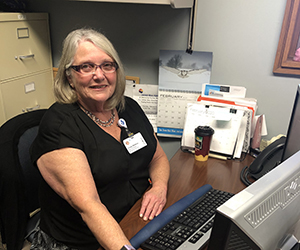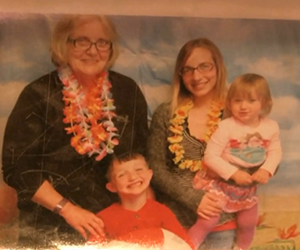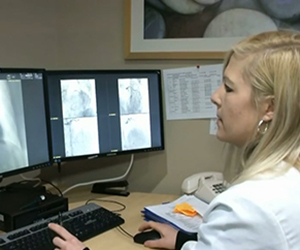Women's Heart Health: Grateful Mom
Women's Heart Health: Mom of two grateful for second chance at life
Life felt full for Cynthia Watkins, between her job and taking care of her two school-age sons. Spring rolled around, and with it a packed soccer schedule for her boys, then ages 13 and 8.
Though that particular soccer season was 22 years ago, Cynthia, who lives in LeRoy, vividly remembers feeling out of breath while walking around the fields and watching her boys play. She also couldn’t seem to stay awake and alert during work seminars.
She chalked all of it up to her busy life—and to a few months of not exercising as much as she should have.
“I thought it was because I was inactive that winter,” said Cynthia, who was 43 years old at the time.
Even after experiencing tightness in her chest, Cynthia figured she just needed some antacids.
“For about a couple of weeks, I was having this discomfort in my chest and I thought it was like heartburn or something like that,” she said. “I would keep taking Tums because it made me feel better.”
‘Don’t downplay this’
But one afternoon that spring, Cynthia couldn’t ignore the signs that something more was going on with her health.

“I went out to run an errand at lunch and I felt like there was a rubber band around my chest,” she said.
Working in a clinic alongside doctors, she decided to ask one of them about the discomfort she was experiencing. The doctor urged her to go to the emergency room at nearby Munson Healthcare Cadillac Hospital.
At the emergency room, wishing she could just go home, a nurse and friend working there told Cynthia she needed to take the symptoms seriously. “She said, ‘Don’t downplay this.’”
Cynthia ended up being transported to Munson Medical Center in Traverse City, where she learned she had an 85% blockage in the left anterior descending (LAD) artery, which supplies blood to the larger, front part of the heart.
“They call this a widow maker, because a lot of the times people don’t have symptoms from what I understand, or they don’t pay attention to symptoms and the blockage can break off and create a heart attack,” she said.
Watch Cynthia Watkins share her story and hear from Dr. Anna Stone, Munson Healthcare cardiologist, in this MedWatch on 9&10 News. Video courtesy 9&10 News.
Finding a way back to good health
While Cynthia didn’t have a heart attack, she realized the seriousness of her situation and that she needed to take better care of herself.

“I don’t want someone else to take care of my kids, that was my first thought,” she said. “I don’t want someone else taking care of my children, so I need to make some changes.”
At Munson Medical Center, Cynthia’s heart care team inserted a stent to open the blockage.
Soon after, Cynthia began cardiac rehab as well as made some positive lifestyle changes. Today, at age 65, she continues to work—she loves her job at Stehouwer Free Clinic in Cadillac—and enjoys spending as much time as she can with her sons and her four grandchildren.
Listen to your body
Munson Healthcare Cardiologist Anna Stone, MD, says it’s common for women in particular to push aside symptoms.

She recommends women get routine examinations with their primary care provider. It’s also important to know your numbers—blood pressure, weight, and cholesterol—as well as your family health history.
“If your dad had a heart attack before age 55, or if your mom had disease before age 65, knowing that you’re at an increased risk is very important,” she said.
Cynthia, who continues to see Dr. Stone to monitor her heart health, also believes in the importance of knowing your family history. She was aware she had some family history of heart issues at the time of her heart issue, and since then has discovered more family members have dealt with heart disease.
She is grateful for the care she received all those years ago—and for the opportunity for a healthy life and to be here for the people she loves the most.
“People need to listen to their bodies, and women need to know this can happen to them,” Cynthia said. “Here I thought I just had heartburn and was taking Tums … I am thankful I went in.”
Know Your Heart
Chest pain doesn’t necessarily indicate that a person has heart disease. Other symptoms signaling heart disease may include shortness of breath, swollen feet or ankles, extreme fatigue, regular dizziness or light headed-ness, heart palpitations, and unexplained aches and pains in your chest, arms, neck, or jaw. Listening to your body is a great first step toward heart health.